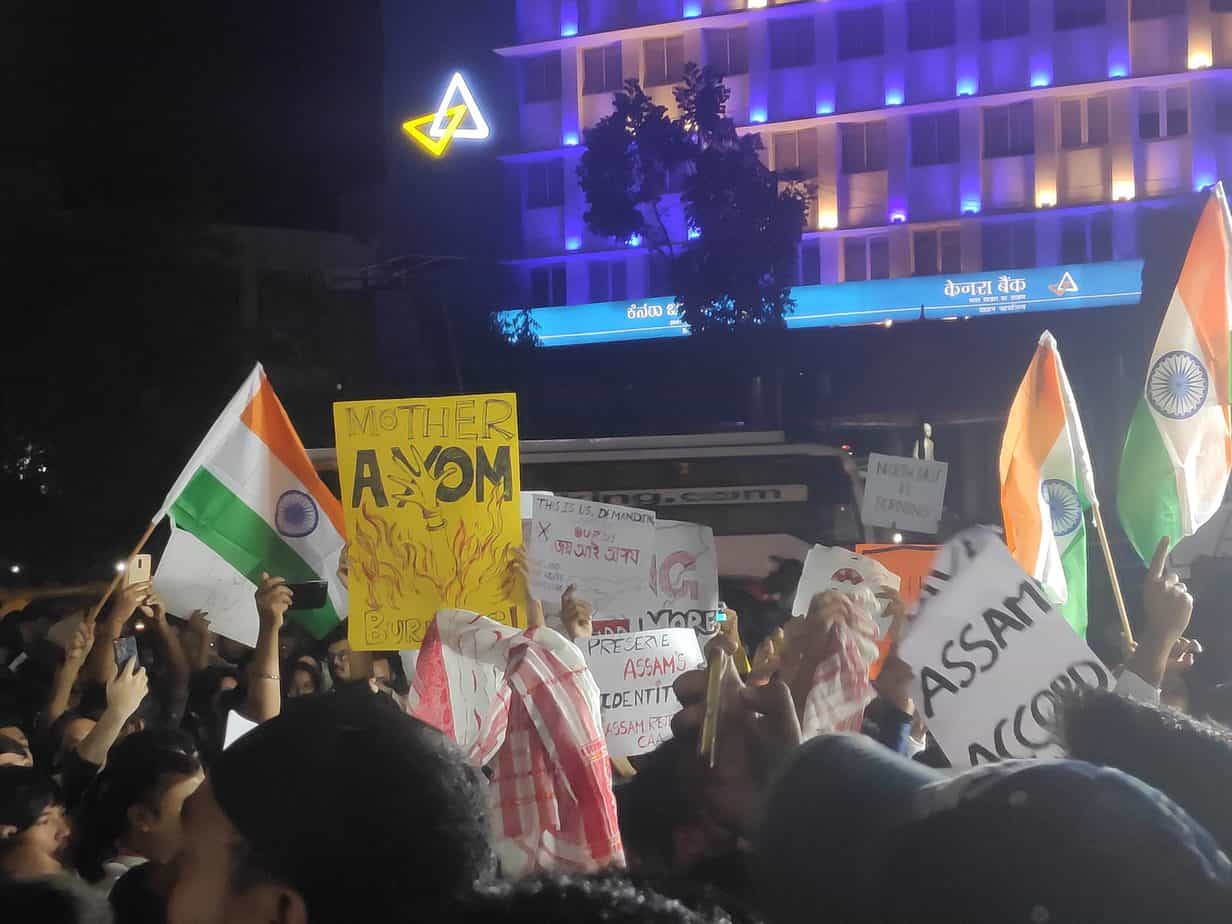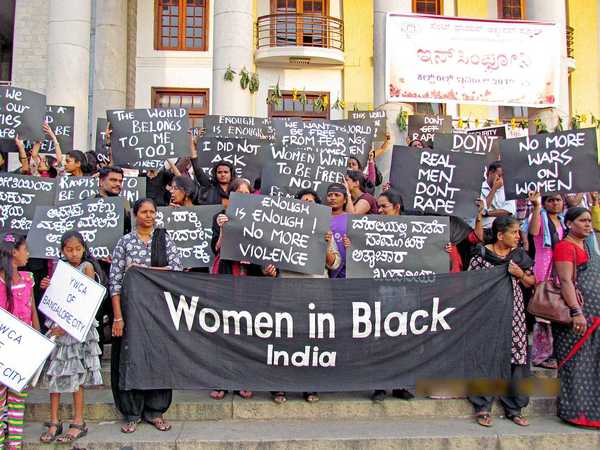Karnataka government has imposed curbs in Bengaluru and some other parts of the state, under Section 144 of the CrPC. The government move came amidst widespread protests against the Citizenship Amendment Act (CAA) and the National Registry of Citizens (NRC). Bengaluru Police Commissioner Bhaskar Rao said yesterday that those who violate Section 144 would be booked.
But what do our laws say about protests? If you want to hold a protest, what rights do you have and what permissions do you need to take?
Do citizens have the right to protest?
The word ‘protest’ is not explicitly mentioned in the Indian Constitution. But the right to protest is a derivative from Article 19(1) of the Constitution which states that citizens have the right to:
- freedom of speech and expression
- peaceful assembly without arms
- freedom to form associations or unions
In that sense, protests are a form of peaceful assembly, where people express their concerns legally.
However, further clauses under Article (19) – Article (19)(2), (3) and (4) – restrict these rights, in the interest of maintaining “the sovereignty and integrity of India, security of the state, friendly relations with foreign states, maintaining public order, decency or morality, or in relation to contempt of court, defamation or incitement to an offence”. Several protests have been denied permission in Bengaluru for ‘maintaining public order’. Disorderly or riotous assemblies are not protected under Article 19 (1).
Besides, state governments can make separate laws to maintain public order, and these laws can regulate citizens’ right to protest. The Karnataka Police Act, 1963, talks about the maintenance of public order.
What permissions do you need to hold a protest?
To hold a lawful protest, you have to get prior permission from the police.
For this, you need to:
- Get the forms to obtain permissions. These will be available at any police station or even on the Karnataka State Police website. The forms need to be submitted in person, not online.
- In the form, you must give details such as the protest venue, timing and duration of the protest, the people or organisations who will be involved, and the reason for holding the protest.
- If you plan to hold a protest rally, you should mention the route the rally would take.
- If vehicles are involved, you must mention the type of vehicle as well as the number of vehicles involved.
- If you plan to use vehicles or stages, the fitness certificate of those should be provided.
- Also, if the protest is to be held in a private property, you must obtain a No objection Certificate (NOC) from the owners of the property.
- You have to get a separate license if you plan to use loudspeakers at the assembly.
- The person or group who leads the protest is responsible for ensuring it is lawful, and must carry the police permit during the protest.

Protest against the citizenship law at Town Hall on December 15th. Pic: Apekshita Varshney
Now, whom should you approach for permission?
- You must submit the forms and get a permit signed by the Sub-Divisional police officer, Circle Inspector, or Station House Officer. The officer has to give you a response within 15 working days.
- If your request is denied, you can approach the Zonal Deputy Commissioner of Police (DCP), who has to respond within 10 working days. Activists usually submit the forms directly to the DCP though, and get a response within a week.
- Since Bangalore City Police jurisdiction is divided into seven zones — East, West, North, South, Central, South-East and North-East, the permit must be obtained from the DCP who has jurisdiction over the protest venue. If you plan to conduct a rally, and the route is split between two different zonal jurisdictions, you have to get permits from the police authority of both zones.
- If the DCP denies your request, you can appeal to the Additional Commissioner of Police who will respond within seven working days.
- The forms for loudspeaker use would be available at the local police station and the KSP website. DCP (Admin) has to give the license within three working days. If you don’t get a positive response, you can approach the Additional Commissioner of Police (Admin), who is supposed to respond within seven working days. If the request is still denied, you can file a second appeal to the Commissioner of Police, who will respond within 10 working days.
- Police officers have to acknowledge your letters, applications or petitions within 24 hours of receiving them.
In Bengaluru, police has denied permission for several protests and have detained protestors too. During a recent protest against the clean chit given to former CJI Ranjan Gogoi in a sexual harassment case, the protestors were briefly detained by the police. Protestors claimed that the DCP had not responded to their request for permission. Advocate Vinay Sreenivasa, among those detained then, says that he has been denied the right to protest, many times.
| What are your rights if you get arrested during a protest?
In the recent protests on CAA/NRC, the police have largely detained protestors – remove them from the venue, hold them in a different location, and release them after a few hours. This is different from an arrest. If you do get arrested during a protest, you have the following rights.
Source: nyaaya.org
|
When can the police deny permission to protest?
The Karnataka Police Act gives police the power to deny permission for protests, but only if there is a sound reason.
Police can refuse permission to protest is if it can cause any threat to the public security, or a law and order problem. Section 31 (w(ii)) of the Karnataka Police Act says that the commissioner or magistrate can prohibit public assembly to prevent obstruction, inconvenience, annoyance, risk, danger or damage to residents or passengers in the vicinity.

Residents of Mahadevapura during the #MahadevapuraDemands protest
Some other sections of the Act too allow regulation of protests:
- Section 31 (On traffic regulation and preservation of order in public places): The City Police Commissioner can regulate the conduct and behaviour of protesters, prescribe the routes by which they have to travel, and regulate the entrance and exit of protest venues.
- Section 35 (Prevention of disorder): The Commissioner can also prohibit the utterance of certain cries, exhibition of placards, pictures etc that may affect public order, undermine the security of the state or incite the commission of an offence.
- Section 40 (Preventing disorder at public meetings): The senior police officer of the highest rank, superior to that of a constable, who is present at a public assembly can give directions to the public to prevent serious disorder or imminent danger to those assembled. To do this, the police can have free access to places of public assembly.
Article 246 of the Indian Constitution also empowers state governments to use agencies such as the police to restore ‘public order’.
In general, there is no code of conduct for protest. But, in a 2009 judgement in the case Destruction of Public & Private Properties vs State of AP and Ors, the Supreme Court had held that organisers of protests shall be personally held accountable for any loss to private and public property caused during protests. The court also told the police authorities to videograph and document such instances so that accountability could be fixed.
Penalty for violations
As per the Indian Penal Code (IPC) Section 141, the government can deem an assembly of five or more people unlawful, if they have assembled with common goal of:
- resisting execution of any law or legal process
- committing criminal trespassing
- obtaining possession of any property using force
- impelling and coercing a person to do what he is not legally bound to do, or
- appalling the government by means of criminal force
Every member of such an unlawful assembly can be punished with:
- imprisonment up to six months or fine (IPC Section 143)
- imprisonment up to two years if people had joined the assembly with objects that could cause harm (IPC Section 144)
Where can you protest?
Protests are mainly staged to show a body (government, public, private) how it has failed the people, and hence the message has to come across loud and clear. So ideally a protest must be conducted in places where the protesters and their messages are visible.
Technically, in Bengaluru you can hold protests anywhere except inside the Vidhana Soudha, as long as you don’t violate public order. Yet protest venues have been reduced to a few locations like Freedom Park, Bannappa Park, Town Hall and Maurya Circle.

Protest over violence against women. Protestors say they are often allowed only at fixed venues like Town Hall and Freedom Park. File pic: Abhishek Kamat
A senior IPS officer, who had previously headed the city’s traffic police, says on condition of anonymity, “One can protest anywhere except near Vidhana Soudha. But since places like Freedom Park have been protest venues for long, people choose to protest there normally.”
But activists disagree. “We only get permission to protests in places like Freedom park, Maurya Circle etc. Else we do not get permission,” says Narasimha Murthy, a lawyer and human rights activist in the city.
According to Tara Krishnaswamy, activist and founding member of CfB (Citizens for Bengaluru), citizens have the right to peacefully gather anywhere as long as they don’t disrupt other goings-on in the public space, but invariably the police confine them to a very specific location. This is the case in any city, be it Chennai, Mumbai, Hyderabad or Delhi, she says.
“A couple of years back, when women were molested on New Year’s Eve near Brigade road, we wanted to organise a protest at the corner of Brigade Road and MG Road, but the police just wouldn’t give us permission. Instead they wanted us to go in front of Town Hall, or Mysore Bank Circle, but there is no meaning in standing there when the incident has occurred on Brigade Road. It sends no message to anyone if we protest inside Freedom Park where nobody can see us; nor would people realise that there’s a protest going on,” says Tara.
For now, it remains to be seen whether protests against the CAA and NRC will continue in Bengaluru, and how the government will handle these.